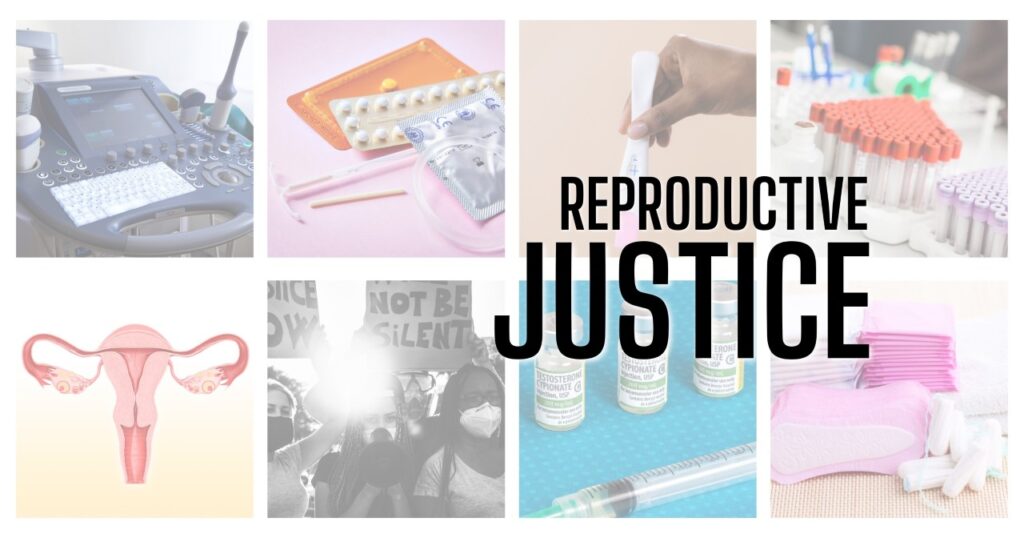UCC churches see reproductive justice as key ministry in 2022
2022 will be an important year for reproductive justice.
States are passing laws that ban abortions closer to conception. The conservative majority of the United States Supreme Court has shown openness to restricting women’s reproductive rights – and the ability to choose one.
Several local churches in the United Church of Christ are already taking steps to protect one’s reproductive rights from a pastoral and a prophetic lens.
‘More than abortion’
St. Andrew UCC in Louisville, Ky., began 2022 with a monthlong conversation on the issue. The Rev. Emma Loane, the church’s associate pastor, said a four-week educational series on reproductive justice has been organized “by a small team of passionate folks within the St. Andrew congregation.”
“Our reproductive justice educational program was designed to depose myths and correct misinformation,” said Diane Snowa, the series lead organizer. “When a digital billboard (in Louisville), messaging God’s love and care for persons choosing an abortion was ordered to be taken down, I knew that as a person of faith ‘for just such a time as this,’ I had to speak up.”
The church has been holding Monday-evening Zoom conversations on different aspects of reproductive justice. They began on Jan. 10 with a discussion about what it is and why people of faith should be interested in it.
“Reproductive justice is so much more than abortion,” said Amy Johnson, UCC minister for sexuality education. She led the Jan. 10 conversation with Essence Ellis, who’s jointly serving a fellowship with the Council of Health and Human Service Ministries and Justice and Local Church Ministries. Ellis also wrote a commentary on reproductive justice for UCC News.
Access matters, too
Both women said the issue isn’t just about choice. It’s also about access.
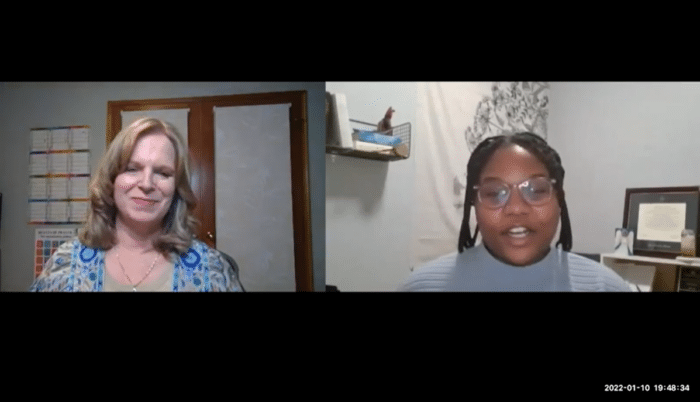
“It’s important to have the conversation because it affects all of us,” Johnson said. “It affects those who want to be parents and those who don’t. Are we able to choose to be pregnant or not? Are we able to access good care for ourselves with either choice? Are we able to openly discuss options with partners, health care providers, friends, and our church community?”
More than that, she said, reproductive justice affects everyone with a body, because body parts need health care. Do people have the means to access quality care? As Johnson said, it’s health care justice intersected with racial justice and economic justice. “I believe all of these conversations belong in church because they are about equity, about understanding and impacting oppressive power structures set up for unequal access – and that is all the work of Jesus and our faith.”
The St. Andrew conversation on Jan. 17 delved into the human rights component on reproductive justice. On Jan. 24 presenters shared local resources, current status and activities related to reproductive justice in Kentucky. The discussion on Jan. 31 from 7:30 to 9 p.m. ET will center on the faith community’s response and ways to take part.
All the online sessions are recorded and posted on the St. Andrew UCC YouTube channel:
David Sickbert helped organize the series, and said he appreciated learning how justice intersects. “So much goes into reproductive justice besides abortion,” he said. “Laying out the connections between economic justice, equal access, racial justice and how they all fold into reproductive justice is an important piece and needs to be articulated. As someone who thought I was ‘in the know’, this has really been an eye opener.”
“We are at a crossroads in Kentucky,” said Sandy Renner, another organizer of the St. Andrew webinars. “With the recent rise of anti-abortion legislation, legislators have become emboldened in their efforts to restrict access to reproductive health care and education. Our voices, particularly voices in the religious communities, need to be heard on this subject.”
‘Difficult choices’
First Congregational UCC in Washington, D.C., has planned a similar online conversation after worship on Sunday, Jan. 30, “to provide space for discussion that lifts up reproductive justice as a faith issue,” said its senior minister, the Rev. Amanda Hendler-Voss.
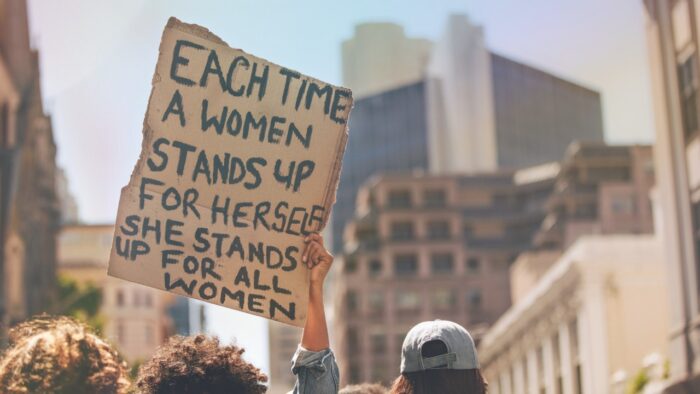
“I grew up in an evangelical home full of pro-life messaging,” she said. “Coming of age, I realized the issue was far more complex than ‘abortion equals murder.’ I worked with HIV/AIDS clients with unintended pregnancies, I pastored women who had made difficult choices that changed the trajectory of their lives, including some who experienced painful miscarriages resulting in the need for a D&C, a procedure categorized by some states as abortion; others who were afraid for their own lives when going into a clinic that was heavily protested.”
With the Supreme Court’s “conservative super-majority,” Hendler-Voss said, “women around the country are bracing for the moment when the legal right to an abortion is no longer guaranteed on the federal level.”
Theology and ethics
First UCC’s Jan. 30 webinar hopes to provide the historical context for the necessary activism and advocacy ahead:
- The Rev. Barbara Gerlach can speak to what it was like for women before Roe v. Wade. Gerlach worked in New York with the clergy consultation service that helped women find networks and resources necessary to assist in making reproductive choices before abortion was legal.
- Sandy Sorenson, director of the UCC D.C. office, will talk about policy and what could happen if Roe V. Wade is overturned.
- The Rev. Kaeley McEvoy, a member of First UCC and associate minister at Westmoreland Congregational UCC, Bethesda, Md., will share her own experience of choosing abortion.
- Essence Ellis will frame the issue through the “intersections of sexual, gender, and racial identity as we consider reproductive justice and its roots in our nation’s history.”
Hendler-Voss hopes to share the intergenerational discussion on the church’s YouTube channel so people “can consider the theological and ethical commitments underlying reproductive justice and examine the breadth of identities and lived experiences impacted by the Supreme Court’s likely decision.”
Faith, dignity, justice
These two churches are not alone. Along with Justice and Local Church Ministries, Judson Memorial Church in New York City and Westmoreland UCC in Bethesda, both helped sponsor – and participated in – a January online SACReD Gathering convened by the Spiritual Alliance of Communities for Reproductive Dignity. The national coalition brought 300 people from 40 states and more than 30 religious traditions together virtually Jan. 25-26 to discuss religious support for abortion access and reproductive freedom.
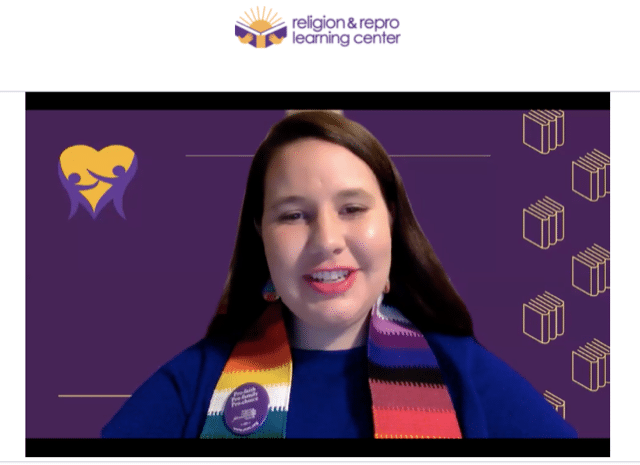
McEvoy, who served as a community minister at Judson while in seminary – and has preached at Westmoreland UCC about reproductive dignity – represented the church along with the Rev. Tim Tutt, its senior minister.
“I first encountered the intersection of faith and reproductive dignity work while I was in seminary,” McEvoy said. “I experienced the process of making a reproductive decision myself and was supported by my Judson community – in particular, [by retired] Senior Minister Donna Schaper.
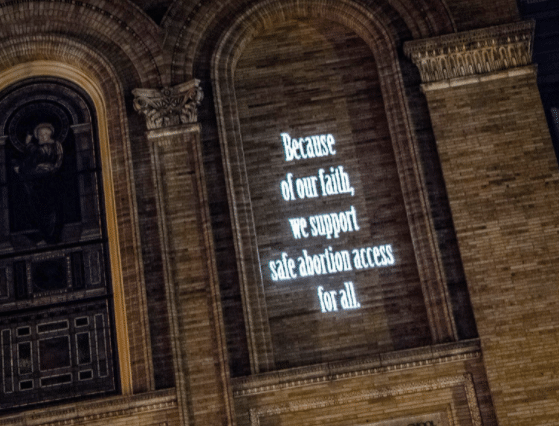
“One of the most formative experiences of work at Judson was participating in a visual art protest we titled ‘The Saints of Abortion,’ where we projected images of women in our congregation who had had abortions (including myself and Rev. Schaper) onto the side of our church.
“One of the reasons I am so excited about the SACReD conference is the leadership of women of color in the reproductive justice movement,” McEvoy said. “One of my transformative understandings of the work occurred when my framework shifted from the reproductive ‘choice’ lens to the reproductive ‘justice’ framework which broadens the intersectionality of issues to include not only options, but access.”
“We know from lived experience that when women and girls have access to education and the full range of reproductive health care, when they are empowered with agency over their own bodies, when they are not under constant threat of violence and sexual assault, their families thrive and communities thrive,” Sorensen said. “This is evident in the United States and around the world. The health of individual women, and their access to the full range of health services, impacts everyone. We need everyone to engage!”
Anticipating court decision
As we approach the summer, when the Supreme Court rulings are expected, discussions on how to ensure options and access will continue.
“We are at a truly perilous time for women’s access to the full range of reproductive health care,” Sorensen said. “Around the country, local faith communities and organizations, like our allies in the National Council of Jewish Women and the Religious Coalition for Reproductive Choice, are hosting forums and strategy sessions on how to defend reproductive justice.”
Related News
A Prophetic Call for Justice and Peace in Palestine
The executive leaders of the United Church of Christ have issued the following statement...
Read More‘Love is Greater Than Fear’: Regional Youth Events get to the heart of gospel message
United Church of Christ teens attending this summer’s Regional Youth Events (RYE) are...
Read MoreUCC desk calendars available to order now
Prepare for your day, month and year with the United Church of Christ desk calendar —...
Read More